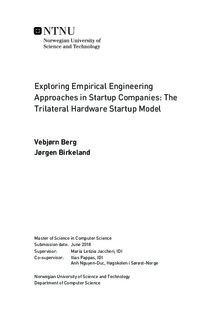Exploring Empirical Engineering Approaches in Startup Companies: The Trilateral Hardware Startup Model
Master thesis
Permanent lenke
http://hdl.handle.net/11250/2565101Utgivelsesdato
2018Metadata
Vis full innførselSamlinger
Sammendrag
Technological advances, decreased component cost, small-batch manufacturing, social connections, and rapid prototyping have lowered the barriers for launching hardware startups. The rising hardware ecosystem has reduced environmental issues related to cost and scalability. Although the obstacles to success are decreasing, hardware startups operate in an environment posing challenges to traditional development and innovation methods. More research should be provided to support engineering activities in the unique and special context of hardware startups.
This Master thesis seeks to explore the work-practices in hardware startups by investigating the role of engineering activities, from idea conceptualization to a launched product. In particular, it investigates factors influencing development speed and agility and explores commonalities, challenges and, situational factors. The research direction was formulated on the basis of Software Startup Engineering: A Systematic Mapping Study.
We performed a multiple-case study investigating 13 hardware startups. Data were collected through semi-structured interviews. Transcribed interviews were analyzed using a thematic synthesis process to create a model of higher-order themes. The findings of this study led to the following three themes third-party dependency, hardware-software integration, and two-folded product quality trade-off operating the hardware startup context. Thus, the study contributes to the area of startup engineering as it draws from the Greenfield Startup Model and extends it with the three unique themes leading to the creation of the Trilateral Hardware Startup Model.
Our study presents initial research results on engineering activities in early-stage European hardware startups. The results indicate that hardware startups achieve rapid prototyping through evolutionary approaches, simple software side solutions, and opportunistic agile practices. Quality assurance is an informal process where testing practices are entrusted to each individual team member. As investing in hardware quality is essential for speed and bringing products fast to market, more research should be provided describing how hardware startups can manage the relationship between restricted resources and increased quality demands.
